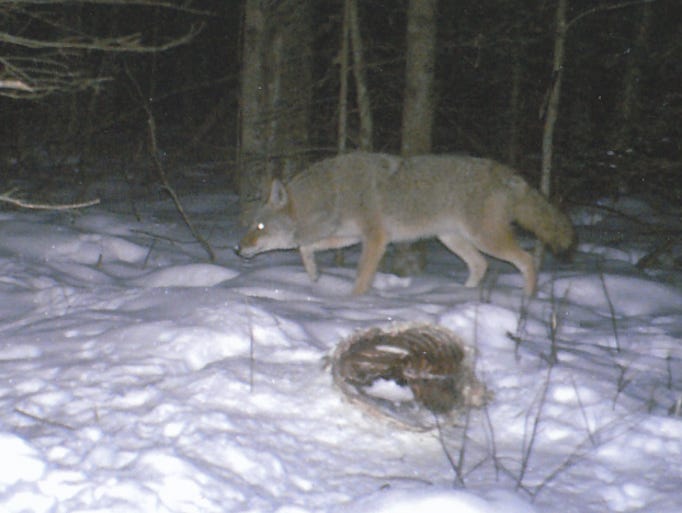
I could not agree more with Rep. Reid Ribble's claim that we should let the experts make decisions regarding Wisconsin's gray wolves.
Unfortunately,
politically entrenched, vocal and powerful hunting, trapping and
livestock groups have been the only forces influencing wolf management
decisions here in Wisconsin. An aggressive, misinformation campaign has
been raging, and wolves continue to face persecutionsupported by false
claims and blatant lies of those who want to eradicate wolves as if they
were vermin. And although these special interest groups and their
politicians have taken the reins to slash wolf populations in the guise
of 'conservation,' nowhere does actual science support the need to kill
wolves.
Wolves have been framed as the enemy, and the scientific
community is very concerned. So much, that 50 renowned wildlife
biologists, experts and researchers from around the country released an
urgent letter calling on Congress to consider the overwhelming science
that gray wolf populationsare nowhere near recovered. In fact,
approximately 360,000 square miles—70 percent of identified suitable
wolf habitat—still remains unoccupied. Accordingly, the best available
science indicates that the gray wolf population remains threatened
throughout a significant portion of its range.
Wildlife
biologists warn this continued threat on wolves will have significant
impacts all the way down the food chain. Over millions of years the wolf
has evolved to play a crucial role in regulating its ecosystem, from
the survival of trees and riverbank vegetation to the health of the
populations of their prey. It is a beautiful, complex tapestry that
shows the level of interaction that must happen between apex predators
and their environment for the full health of the system.
The
threat of depredation by wolves on livestock has been an ongoing concern
for Wisconsin farmers. Lethal control will only relieve conflict
temporarily. Eventually, new wolves will move into the vacated territory
and the cycle of loss will continue—unless the root cause is
addressed.Modern, non-lethal methods of prevention have shown to
successfully reduce depredations, if implemented properly. However, we
have yet to so much as see Wisconsin bat an eye at exploring any
non-lethal methods of wolf management.
Furthermore, the lethal
approach has biologists concerned that these types of conflicts will
only be enhanced. What happens to a wolf pack if the family breadwinners
are killed? Young wolves need pack leaders to teach them how to hunt.
Losing the strong, savvy wolves can be devastating to the entire pack
dynamic. Take the biggest and best hunters out of a pack, and you turn
the rest into depredators. For the less skilled, it is much easier to
kill a sheep than it is to run down a deer.
Wolves may also pose a
threat to dogs, but hardly to the "family pet" kind that Mr. Ribble is
alluding to. According to the WDNR's own records, nearly 95 percent of
dogs killed by wolves were hunting hounds. Wisconsin is the only state
to allow wolf hounding and also permit hunters to run their hounds on
wolves and other wildlife for training 24/7, year-round. When these dog
packs meet up with wolves, does it come as a surprise to us that there
is death and maiming on both sides? Wolf hounding is no more than an
orchestrated dog fight and inhumane act of slaughter that should have no
place in modern society. So perhaps what Mr. Ribble should be calling
for, rather than managing wolves to "protect our dogs," we should
instead bring an end to the barbaric and unnecessary blood sport of
hound hunting.
Wolves are a very misunderstood and misrepresented
species. It appears our wildlife agencies will permit just enough
numbers to survive so those who enjoy killing will have enough to
satisfy their hatred for wolves. What about the overwhelming scientific
evidence that says wolves are crucial to the health of our forests?
Any
legislation that interferes with existing federal wolf protections
would not only be harmful to wolf recovery, but it would also undermine
one of the most effective and important environmental laws in US
history. The entire wolf restoration program was guided by directives
contained in the Endangered Species Act, a law created to ground a
cornerstone of science that says the healthiest, most stable natural
systems tend to be those with high levels of biodiversity. It is time to
revisit this very principle and make wolf management decisions based on
hard science—not political agendas.
Perhaps Rep. Reid Ribble and his political counterparts should step aside, so that the true experts may be heard.
Britt
Ricci is a UW-Madison graduate of Geography and Environmental Studies
living in the heart of wolf country in northern Wisconsin, and a
published writer for Wolves of Douglas County Wisconsin, a grassroots
organization founded in 2012.


No comments:
Post a Comment